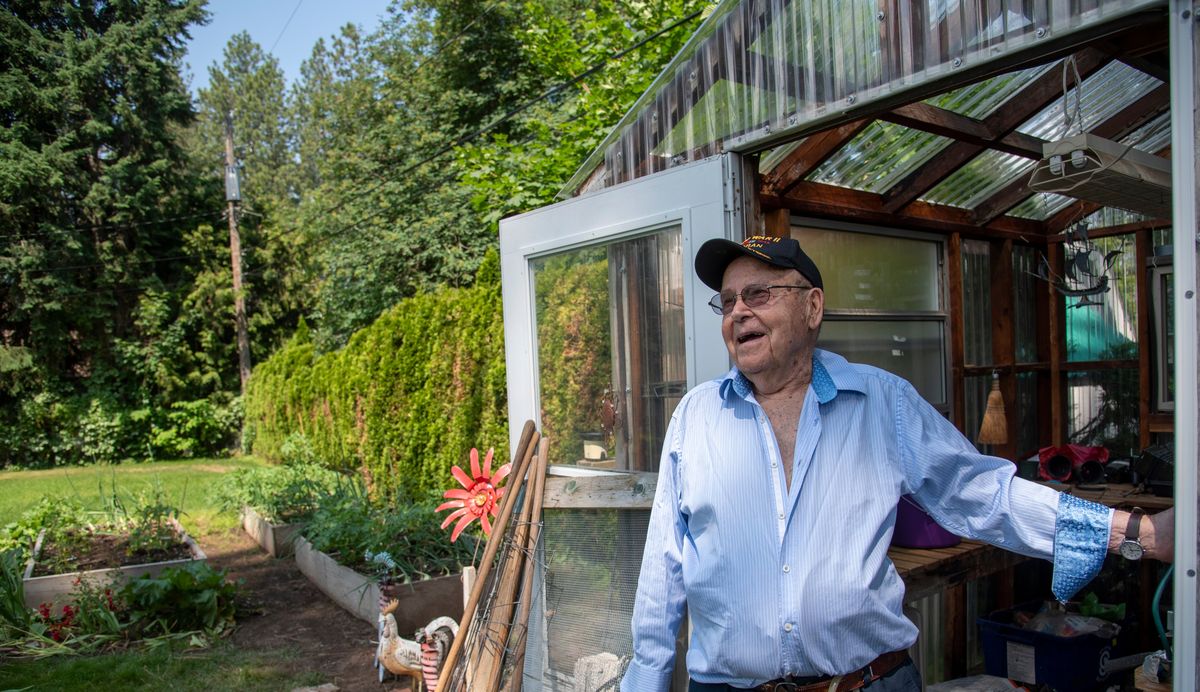Spokane Valley veteran has prized garden boosted by his composting methods

A gardener for 60 years, Bill Palmer still tends to thriving greenery.
He’s 95, and Palmer already has a June bounty of lettuce, tomatoes, onions and rhubarb.
While he uses a walker to move about raised garden beds in his Spokane Valley backyard, Palmer continues one proven method he’s sworn by since 1963 – regularly tending to compost piles that transform sandy soil into the black loam beneath his plants.
Loam is ideal for a garden because it holds nutrients and has a texture that retains water long enough for plant roots to access, yet it drains well so that roots don’t rot. Without a quality soil, plants struggle to survive and usually require supplemental feeding and watering.
“I learned by doing,” said Palmer, a Navy veteran and former elementary school principal. “I started to learn more and more. Then I was teaching others. Everyone can have black soil like this. All it takes is W-O-R-K.”
Part of that work is to turn the compost about four times a year. He regularly adds organic matter such as dead leaves, lawn trimmings, potato peelings and coffee grounds.
“It’s a lot of leaves from the fall, probably 90% leaves,” he said. Neighbors used to bring him piles of yard debris, back when he had a larger operation. He’d share his crops with them.
To make sure the compost pile is at work slowly breaking down matter, he uses a probe to check if it’s at a warm enough temperature.
He has taught all of his composting methods to his family, and some of them use his techniques, he said. Palmer and his wife, Caroline, have three sons.
Turning 96 next week, he was born in the Okanogan Valley in 1927. Palmer joined the Navy at age 18 out of high school and was in boot camp when the Japanese surrendered at the end of World War II. However, he soon was on a ship helping 2,000 soldiers return to the U.S. for a mission called, “Operation Magic Carpet.”
That required him to travel by train into Japan, and Palmer said he briefly visited Nagasaki about six months after the second atomic bomb was dropped there.
Following his military service, he returned to Spokane and used the GI Bill to get his teaching credentials.
Palmer began as a teacher, first in Deer Park, but he spent a majority of his career as a principal at several Central Valley School District elementary schools before retiring in 1982.
Tinkering in the garden gave him quiet time, although he sometimes listened to football games on the radio. He has a sign near the compost area today that says, “A garden is where the soul feels at home.”
For his modern garden, though, Palmer admitted he’s made one concession of late. He used to grow plants from seed in his greenhouse.
“Is it cheating to say I went to Appleway to buy these?” he joked, in describing the tomatoes he bought at Appleway Florist & Greenhouse.
He credits laughter and a good attitude as the seeds that have kept him going. And he’ll keep on gardening.
“I can sit on this walker and hoe,” he said. “You can say, he hoe-hoe-hoes in June.”